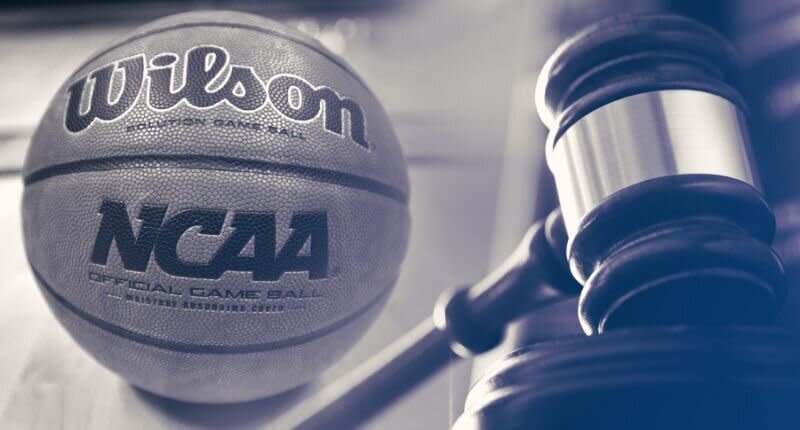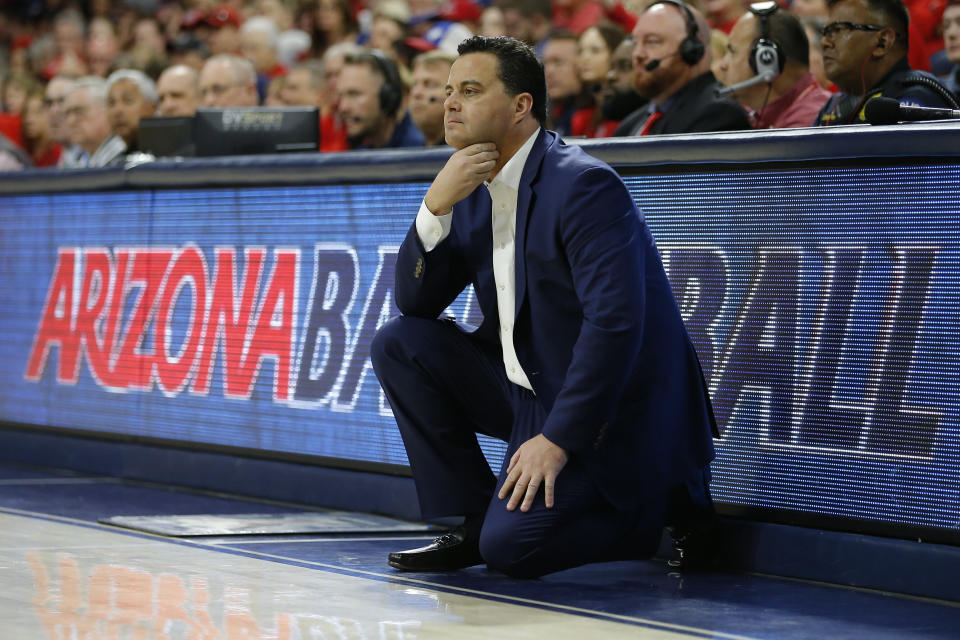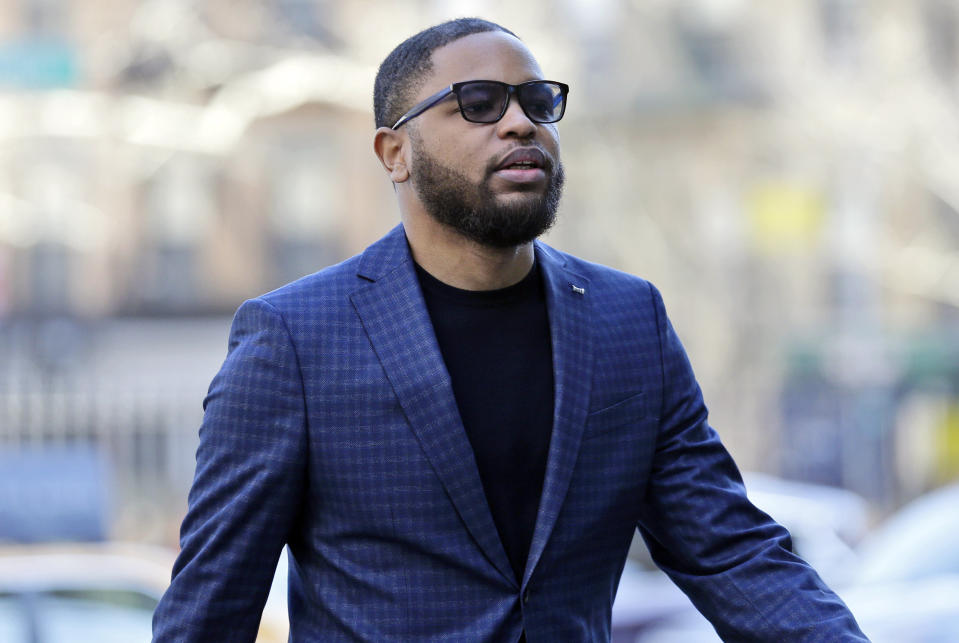Can NCAA handle hoops scandal? 'It's time to get this right'
NEW YORK — Wednesday marked a terminus in the long-running federal probe of corruption in college basketball. Verdicts were returned in the second of three trials, and the third trial was pre-empted by a guilty plea from the last defendant holding out. At least 10 men have been found guilty or accepted plea deals. The courtroom drama is over, the feds’ work all but done.
Now, after more than 19 months on the sidelines waiting to fully engage the broadest scandal to ever hit college hoops, NCAA Enforcement personnel is in the game.
Can they win it?
The definitive answer to that question likely won’t be known before 2020, but the legwork has begun and will soon accelerate. The credibility of the NCAA as an investigative body is at stake.
“For all the good in college basketball, we've had this cloud over our head for too long,” said the Oklahoma athletic director Joe Castiglione. “As I talk to people throughout the industry, this is our one opportunity to aggregate our resources and address those who have tried to cheat their way through the business. I understand there are many complexities, I understand it's going to require some time, but it's time to get this right.”
Wiretap after wiretap, witness after witness, college basketball was exposed as a sport operating at the highest level with cynical disregard for the association’s rules. Schools implicated through court evidence and media reports have responded with little substantive action, seemingly waiting for the NCAA to show it can take care of the dirty work. The entirety of Division I athletics will be watching.
“I have a lot of respect for [NCAA vice president of enforcement] Jon Duncan and that crew,” said Ohio State athletic director Gene Smith. “My assumption is that they've been laying in wait.
“They have to do something. … There’s a lot of smoke.”
Since the bold rhetoric of FBI and government officials when 10 men connected to the sport were arrested in September of 2017, there has been little significant consequence in regards to the head coaches whose programs have been implicated. Aside from the firing of Louisville coach Rick Pitino, assistant coaches tied to the scandal have lost their jobs at USC, Arizona, Oklahoma State, Auburn, TCU and Clemson. Another assistant coach, Preston Murphy, remains on administrative leave at Creighton after his name arose in a superseding indictment for allegedly accepting a $6,000 bribe, an act later shown on secretly recorded video played in court. (It has not gone unnoticed in the coaching industry that all of the assistant coaches arrested, indicted, implicated and/or fired are African-American.)

Just how daunting is the task before the NCAA? A Yahoo Sports analysis of all the reverberations from the federal cases reveals that more than 50 schools have at least been named in one form or fashion via federal documents, court evidence, testimony or original reporting. More than half the programs from the seven most prominent leagues — the American, Atlantic Coast, Big 12, Big Ten, Big East, Pac-12 and Southeastern conferences — have been associated with some activity that could draw NCAA or campus compliance scrutiny. Not all of that would rise to the level of major investigations or sanctions, but several of them will.
The Yahoo Sports analysis points to roughly a dozen potential major infractions cases (some of which are underway):
Louisville: The Cardinals, still under probation for a previous infractions case that resulted in vacating their 2013 national championship, were implicated in a payment scheme for recruit Brian Bowen and a potential scheme for prospect Balsa Koprivica. Per testimony and evidence, assistant coaches Jordan Fair (fired) and Kenny Johnson (now at La Salle) were directly involved. That includes Bowen’s father testifying under oath Johnson personally paid him cash while the Cards were on probation.
North Carolina State: Adidas bag man T.J. Gassnola testified that he made cash payments to people close to one-and-done Wolfpack player Dennis Smith Jr. An ESPN report cited a court disclosure saying that then-head coach Mark Gottfried also was personally involved in funneling money to Smith, with assistant coach Orlando Early as a middleman. A Yahoo Sports report cited ASM Sports documents alleging that Dawkins and the agency also were paying Smith.
Kansas: Gassnola testified that he made payments to people close to Jayhawks players Billy Preston and Silvio De Sousa. A Yahoo Sports report revealed alleged payments by Dawkins and/or ASM Sports, the sports agency for which he worked, to the family of Kansas player Josh Jackson.
Text messages entered into court portrayed head coach Bill Self as being in close contact with Gassnola regarding the recruitment of prospects to Kansas, including the De Sousa recruitment. A wiretap transcript read at the first trial detailed a conversation between assistant coach Kurtis Townsend and convicted Adidas consultant Merl Code discussing potential payments to land star recruit Zion Williamson.
Arizona: Head coach Sean Miller and no fewer than three of his assistants — Emanuel “Book” Richardson, Joe Pasternack and Mark Phelps — have been implicated in NCAA issues via testimony, documents, Yahoo Sports reporting and the university’s own statements in a variety of potential NCAA issues.
Miller’s name came up frequently during the second federal trial in reference to alleged schemes to pay players, with Dawkins’ defense attorney Steve Haney asserting in a pre-trial hearing that evidence “establishes very clearly that Sean Miller is paying players in Arizona.” Richardson was fired, has pleaded guilty to bribery charges and is awaiting sentencing. Phelps is on administrative leave and could be let go when his contract expires June 30. Pasternack is now the head coach at UC-Santa Barbara.
Former Arizona players mentioned include Deandre Ayton, Rawle Alkins and one-time Wildcats commit Jahvon Quinerly. Arizona also allegedly made a $50,000 offer through Dawkins for Bowen.

LSU: A transcript of a wiretap read in the first trial last fall detailed head coach Will Wade talking to Dawkins about recruiting Class of 2019 big man Balsa Koprivica. Yahoo Sports reported in March on another wiretap, which captured Wade telling Dawkins about a “strong-ass offer” he made to middleman Shannon Forman for recruit Javonte Smart. An FBI-recorded conversation introduced in the second trial included Richardson saying that Wade had “$300,000 for” recruit Naz Reid. ASM Sports documents viewed by Yahoo Sports also make mention of LSU players Brandon Sampson and Tim Quarterman.
USC: Fired assistant coach Tony Bland was seen on FBI videotapes receiving what was alleged to be a $13,000 bribe. Testimony alleged that Bland was trying to recruit Marvin Bagley III and deliver him to financial advisers. ASM documents show that Dawkins reported making payments to people close to USC players Chimezie Metu and Bennie Boatwright. An ESPN report said Dawkins targeted Trojan De’Anthony Melton for impermissible payments.
Oklahoma State: Testimony in the first trial alleged that the Cowboys had offered $150,000 cash, $5,000 for a car and an undisclosed amount for a house in the recruitment of Bowen. Fired assistant coach Lamont Evans received at least one payment in 2017. Oklahoma State player Jeffrey Carroll had his name come up in the second trial; he sat out the first three games of the 2017-18 season as the school did its own investigating after Evans was indicted.
South Carolina: Former assistant Evans, before moving on to Oklahoma State, allegedly was involved in a bribe scheme revolving around Gamecocks player P.J. Dozier. Dawkins’ ASM Sports documents also allege payments to Dozier. Court testimony also alleged that a professional basketball agent, Seth Cohen, was paying Evans in an attempt to recruit Dozier.
Auburn: Fired former assistant Chuck Person took a plea deal for conspiracy. Staff members Jordan VerHulst and Frankie Johnson were put on administrative leave in 2017-18 and never returned. Players Austin Wiley and Danjel Purifoy both missed all of the ’17-18 season, and Purifoy missed part of the 2018-19 season as well.
TCU: Fired assistant coach Corey Barker was on video surveillance accepting an alleged $6,000 bribe. Dawkins testified that Barker repaid the money shortly thereafter.
Creighton: Assistant coach Preston Murphy, currently on leave, was seen on video surveillance in the second trial accepting an alleged $6,000 bribe. Testimony in the first trial alleged that Creighton made an impermissible benefit offer for Bowen.
Clemson: Fired assistant coach Steve Smith was on video surveillance discussing payment plans for prospective recruit Zion Williamson.
That’s a flooded crime-and-punishment market, though Duncan expressed confidence to Yahoo Sports that his department can handle the load. According to NCAA statistics, its enforcement team opens an average of 150 cases per year across all three of its divisions. As of Jan. 31, the NCAA had 15 Division I cases in the preliminary investigation phase, 25 active investigations, nine in the processing stage and 13 submitted to the Committee On Infractions.
It’s unknown how many of those would qualify as high-profile cases with the potential for major sanctions. Seemingly, most of the potential cases listed above would fit that description.
“A high majority of men’s college basketball coaches want the NCAA to be aggressive with these cases,” said Toledo coach Tod Kowalczyk, the chair of the NCAA Division I men’s basketball ethics coalition.
The fact that much of the sanctioning will be left up to the NCAA has coaches and administrators skeptical that significant results will follow. After all, this is the very organization whose ineffective enforcement of rules allowed basketball recruiting to devolve into the free-for-all these trials exposed.
“I’ve heard it said time after time, if people who cheat are going to get away with it, what kind of message does it send?” Castiglione said. “We've got to get this negativity out of our world, and we've got to be aggressive doing it.”
Gaining cooperation from those with firsthand information could be difficult as well. People like Christian Dawkins are highly unlikely to sit down and divulge information to enforcement representatives anytime soon, and most of the implicated players are no longer in college and not beholden to cooperate with the NCAA. Fired assistant coaches with no interest in returning to college coaching would seem similarly uninterested in cooperating.

Even Duncan acknowledges that he hears the doubts from coaches and others around college basketball.
“We'll pursue our mission aggressively and attempt to protect the compliant coaches to make sure they’re not disadvantaged by their commitment to compliance,” he said. “That’s on our wall as part of our mission, and we take it very seriously. I view it as a reminder to the coaches that we’re trying to serve.”
Yahoo Sports spoke to a pair of former NCAA investigators who expressed general pessimism about how this investigation will play out in terms of the NCAA enforcement staff being able to achieve significant results. Even with the help of evidence, documents and testimony from the federal trials and the ability to directly import such information, they predicted the NCAA will struggle to find cooperative witnesses and corroborating evidence. (Also, there is little chance the court will accede to a motion from the NCAA asking for access to government evidence that was not entered into court.)
“In terms of bringing down big-name coaches or putting big-time programs on probation with significant penalties, I am less confident that’s going to happen,” said Dan Matheson, a professor of sport management at the University of Iowa and a former NCAA associate director of enforcement. “I have not got the impression, at least from what’s available publicly in the news, that there’s been a lot of individuals that are offering up the big-name coaches. Going back to when this case was announced a couple of years ago, I don’t think you’ve seen the wide net being cast that’s brought in the number of big-time coaches that were originally expected. The damage is being limited to some of these assistant coaches.”
Added a former NCAA investigator who declined to be identified: “There’s a lot of folks that don’t have to talk to them. I don’t think it’s going to end up being that many schools. … I don’t think they have the resources and manpower to go after everything legitimately, even if they wanted to. They have to do the stuff [that’s] out in the press heavy. The big names and the head coaches. I don’t mean this all negative, but they’re going to do what they can [to save face].”
Duncan, however, wants the public to know that this isn’t the same old NCAA that existed before his arrival in 2013.
"Our staff has changed significantly," he said. "The tools we have and our approach has changed dramatically. It’s dramatically different, legislatively and philosophically."
Can the staff complete the investigations in a timely manner? Some have been underway for quite a while now and could lead to notices of allegations in the near future, while others are closer to the initial stages. Considering the arrests happened 19 months ago, a long investigative process only increases the chances of punishments being handed down long after the perpetrators have moved on.
Duncan recently laid out a timeline for a typical case: After the investigative work is complete, the enforcement staff must make a charging decision. If charges are made, that would result in a Notice of Allegation to the school. That school would then have 90 days to file a response to the NOA, and the NCAA then would have another 60 days to respond to that response. At that point, a hearing would be scheduled some 30-60 days out, with a decision in another 60-90 days.
Thus, if a Notice of Allegation could be prepared and delivered by July 1 — seemingly an ambitious timetable — a ruling might not be made before the 2020 NCAA tournament. And that’s before appeals are factored into the process.
"It's going to be a major undertaking,” said Josephine Potuto, a Nebraska professor and longtime infractions committee member. “Having that many major cases going at once is going to take its toll. ... There seems to be a lot of overlapping information. How are they going to keep it all separate? I have a lot of 'I don't knows' in this.”
The element of the NCAA rulebook that will likely be tested — and perhaps defined — as this plays out is head coach control. Simply put, will coaches like Sean Miller and Bruce Pearl be sanctioned for lawbreaking and rule-breaking by their staffs?
The rule was created to prevent the very pattern that already has formed in this investigation: Assistant coaches taking the fall and head coaches continuing to make their millions unimpeded. The rule itself — 11.1.1 — states that a head coach is “presumed to be responsible for the actions of all assistant coaches.” With four assistants having pled guilty to felonies, two others having been fired and two more on administrative leave, that rule will be brought sharply in focus.
"There is almost certainly going to be charges of head coach responsibility, and there may be failure to monitor and lack of institutional control,” Potuto said. “Then it depends how much agreement there is between the institution and enforcement on the charges. The chance of disagreement is going to be higher when it comes to lack of institutional control.”
More from Yahoo Sports:

